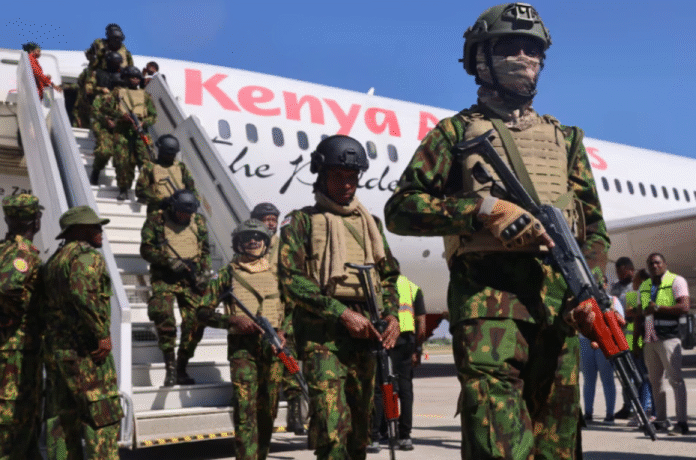Saturday, July 5, 2025-HAN
By Olive Burrows
Source: Citizen Digital

With just 10 days left before the mandate of the UN Integrated Office in Haiti expires, UN officials are raising alarm over the country’s deepening crisis. They warn that without urgent action to renew and bolster the mission, particularly its support for the Kenya-led MSS force, Haiti risks total state collapse. While Kenya seeks to project progress on the security front, UN officials describe a grim reality: gangs tightening their grip on the capital, and a peacekeeping force dangerously under-equipped to push back.
As Kenya marked a year since it first deployed police to Haiti as the lead in a Multi-National Security Support mission.
“We have a government in place, hospitals have been reopened, security of presidential palace, the international airport and sea port,” said Amb. Yabesh Monari, Deputy Permanent Representative, UN.
The United Nations Secretary-General has warned that without adequate resourcing, the mission’s impact on Haiti’s security will be not only limited, but short-lived.
“We have continued to witness a sharp erosion of state authority and the rule of law. The capital city was for all intents and purposes paralyzed by gangs and isolated as a result of the ongoing suspension of international commercial flights into the Toussaint Louverture International Airport,”said Miroslav Jenča, Assistant Secretary-General for Europe, Central Asia and the Americas, UN.
“Since then, gangs have only strengthened their foothold, which now affects all communes of the Port-au-Prince metropolitan area and beyond, pushing the situation closer to the brink.”
“Organized criminal groups have gained near-total control of the capital, with an estimated 90 per cent of Port-au-Prince under their grip. Despite their best efforts, the MSS and Haitian National Police have been unable to make headway in restoring state authority and, without additional security support from the international community, the outlook is bleak,” said Ghada Waly, Director-General, UNODC.
Antonio Guterres, in a letter to the Security Council in February, warned that with the MSS reliant on donors for essential equipment, many of its armoured vehicles are ill-suited for the urban environment of Port-au-Prince and a shortage of spare parts has rendered half their combat vehicles non-serviceable.
Further, a lack of adequate air support, communication systems and intelligence capabilities undermine the effectiveness of the mission and risk the lives of the officers.
“Without forward operating bases, the gangs come back,” said Amb. Yabesh Monari.
The plan was 12 forward operating bases; there are currently three. At least 2,500 officers were to be deployed; they are currently 991, with 735 from Kenya.
“We are operating at less than 30 per cent of capacity. It is imperative that this discussion lead to clear actionable guidance on the future of MSS, as such direction is essential for Kenya to make informed decisions regarding the continuation of their commitment,” said Amb. Yabesh Monari.
Kenya is operating in an increasingly complex environment.
“We are seeing a rapid growth in the number and activities of private security companies and vigilante self-defence groups,” said Miroslav Jenča.
And with the US under Donald Trump warning that it cannot continue to bear the greater fiscal burden of the mission, the clock is ticking on a UN Security Council adoption of Guterres’ proposal to have a UN support office established to provide logistical and operational support.




